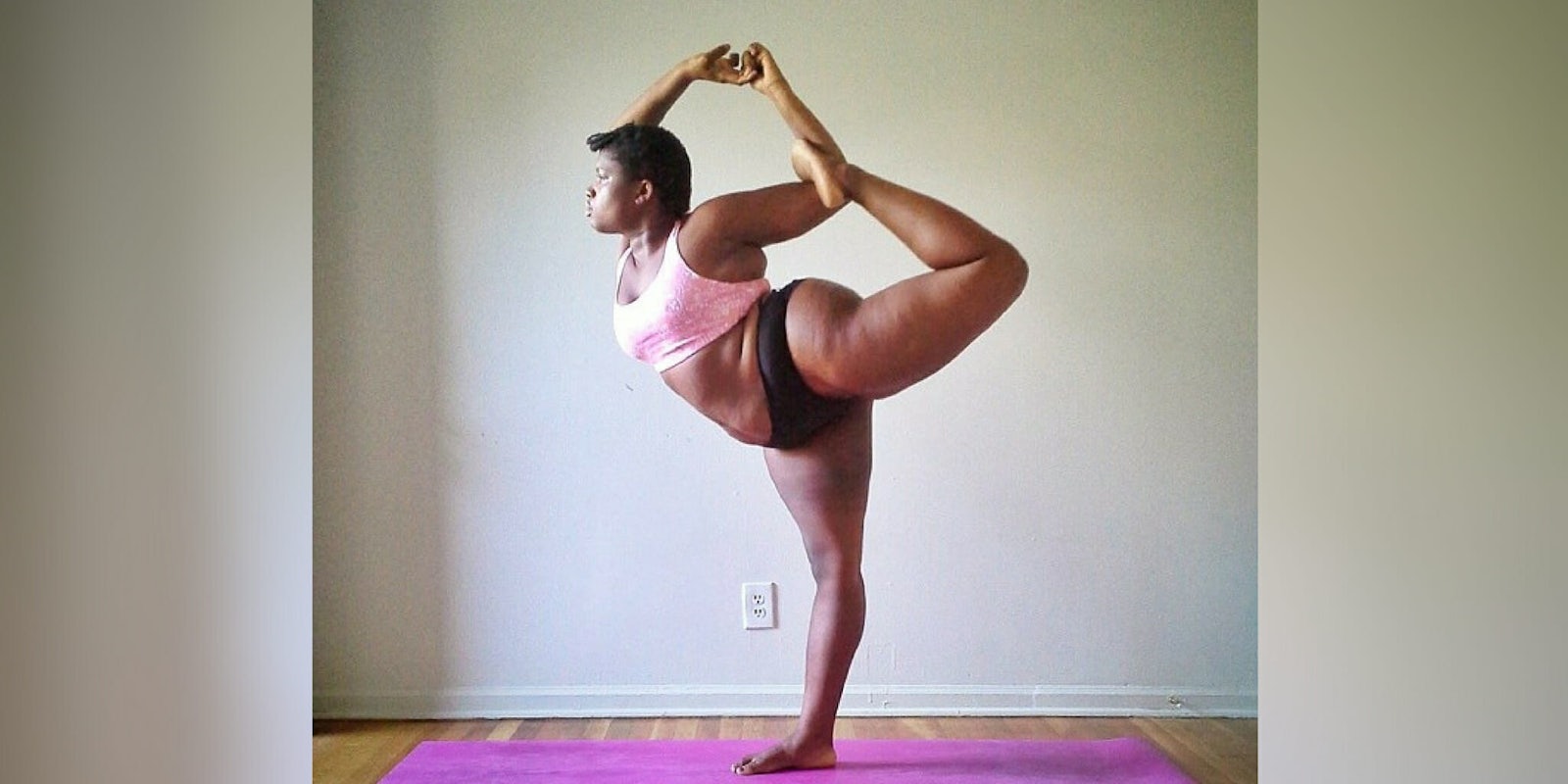Jessamyn Stanley never intended to become a yoga teacher. However, it’s no surprise why hundreds of thousands of people resonate with her yoga practice on social media. In the years since she first started sharing photos of her home practice on Instagram (using Harry Potter books as blocks and a dog leash as a yoga strap) Stanley has taught classes internationally, launched her own book and podcast, and has partnered with companies including the New York Times, Target, JCPenney, Samsung, and Kotex.
Many have been inspired to do yoga after seeing themselves represented in her practice. Yoga isn’t just for stereotypically thin, white, rich women slinging high-end yoga mats. Stanley’s message is simple: Yoga is for everyone. And there’s no one “right” way to do your practice.
9 fascinating facts about Jessamyn Stanley
1) Stanley practices yoga, but doesn’t take on titles such as “yogi”
Stanley still describes herself as a fat femme and a yoga practitioner. She has always identified herself as a fat femme because it’s “empirically true,” and identifies as a queer femme as well. Her desire to identify as fat, she explains, grew more after seeing how people react to those who take ownership of the word. She also calls herself a yoga practitioner—not “yogi,” or any other forms of the term.
“I try to live the [practitioner] lifestyle as much as I can, and it’s really very much just a practice of that lifestyle than anything else,” she told the Daily Dot.
READ MORE:
- The pride and pitfalls in LGBTQ labels
- Why ‘hip cleavage’ is this year’s unreasonable body standard
- Can you be body positive if you hate your own body?
- What exactly is intersectionality? A complete history of the term
2) Stanley said teaching was never her goal when she started practicing yoga
Stanley joined Instagram well before marketing and models hit the scene. She was uploading photos of her home practice after noticing other practitioners doing the same. However, she continued after realizing that fat yoga practitioners had a visibility issue. It was as if she was an anomaly. She regularly received comments like “I didn’t know fat people could do yoga.”
Even after investing more in fat yoga practitioner visibility, she still didn’t think yoga would become her job. Yoga teacher training (which Stanley refers to YTT), however, completely changed those intentions.
“I didn’t realize that in truth what makes you a good teacher is really living your own practice, and living it so much that you request it to other people. Ultimately, everything you do that you teach someone else is something that you’re working through to teach yourself, and that practice of really digging within yourself, it feels like having your soul cracked open. I know that it’s super hyperbolic, but it’s truly that way,” Stanley said.
Stanley says that she’s had to overcome many obstacles to get to where she is now. She knows that not everyone can relate, nor will leave her classes feeling like they see themselves in her. But if at least one person can leave class feeling that way, Stanley says, that’s reason enough for her to teach.
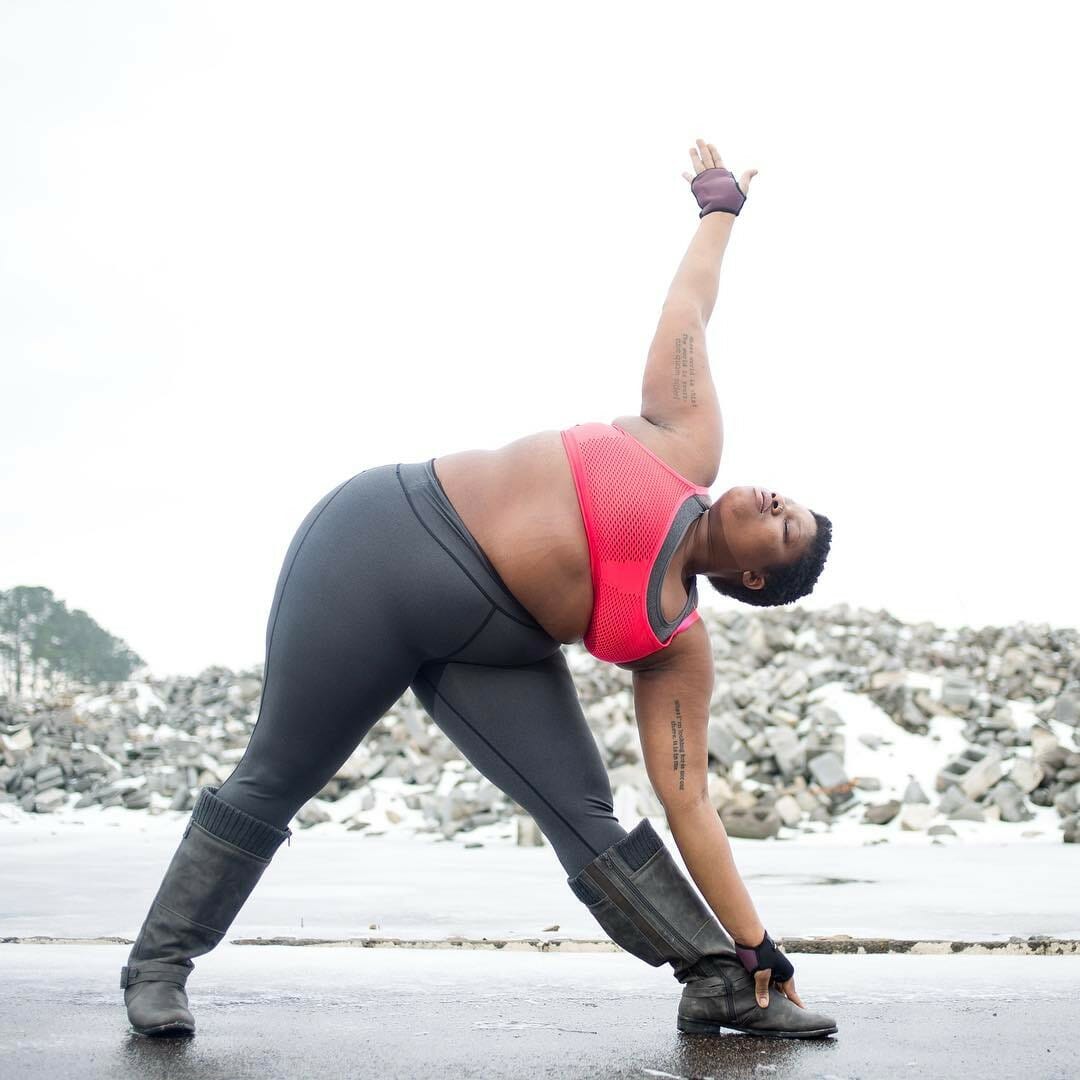
3) She aims to teach in every location her followers have requested
After leaving training, Stanley asked the internet where they wanted her to teach. She has a spreadsheet of these locations across nearly every country and continent. Her goal is to share her yoga practice, whether that’s through in-person teaching or various online projects.
Along with teaching live classes internationally, Stanley hosts online classes for those who can’t be there physically. Plus, she wrote her book in hopes of reaching those who want to begin a yoga practice on their own.
“Everything that I do is ultimately just coming back to that same spreadsheet, trying to reach everyone who asked me to teach them,” Stanley says.
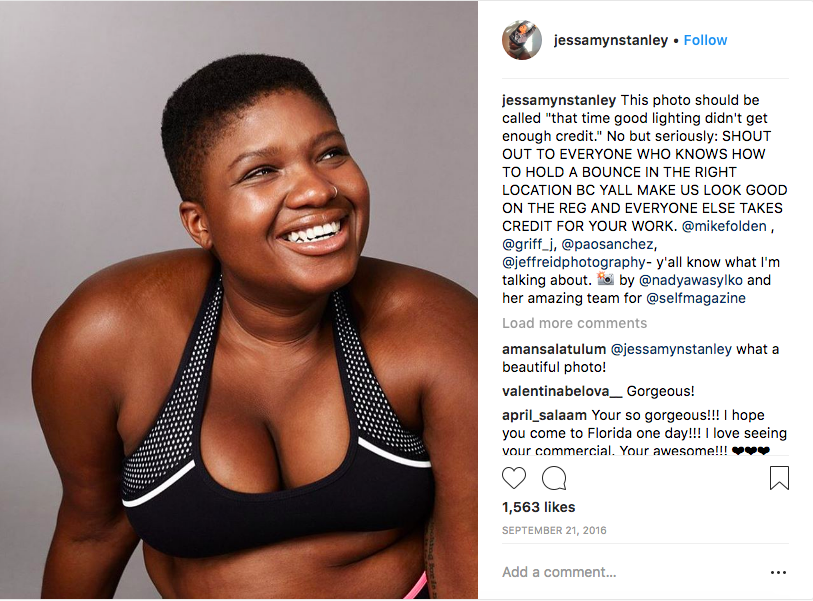
4) Stanley wouldn’t have an Instagram account if not for its value as a teaching tool
Stanley’s social media presence is valuable simply because of her reach. But it’s also valuable in that she allows others to see what a yoga practitioner really looks like. Still, she said if she hadn’t made an Instagram years ago, she probably wouldn’t have one now. For Stanley, looking for answers from outside sources—rather than from within—goes against the tenants of her practice.
“I think that’s something that’s worthwhile. Everything is just coming back to that goal,” Stanley said. “And I think when I’m not meant to teach yoga anymore, and when I’m not meant to be on social media anymore, I won’t, and I’ll do something else.”
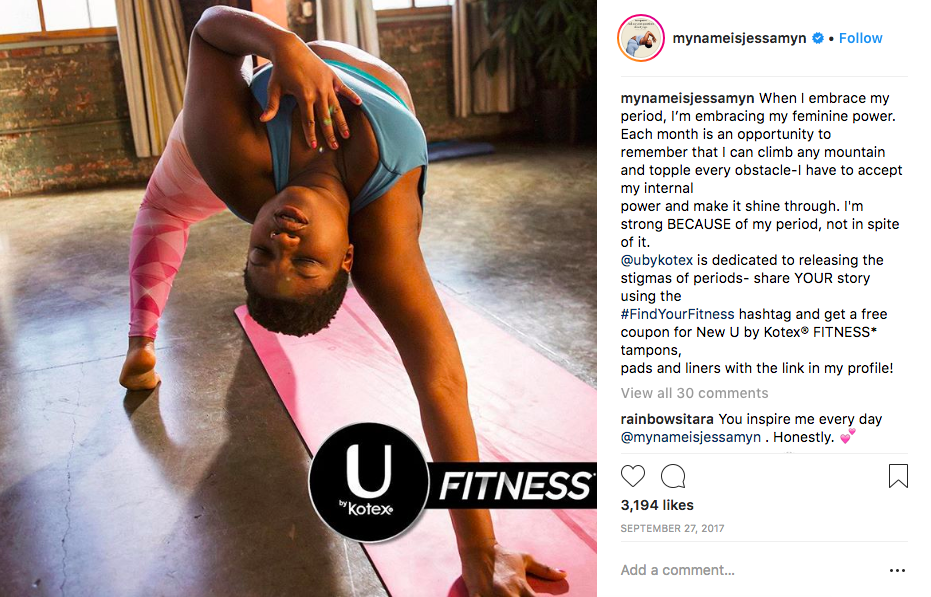
READ MORE:
- The best self-care tips and ideas
- What does a healthy relationship really look like?
- 10 sex-positive facts about Lust Cinema and its feminist founder, Erika Lust
- Lena Dunham serves Instagram a reality check on body standards
5) Stanley is currently working on her second book
She’s currently working on the follow up to her first book, Every Body Yoga: Let Go of Fear, Get On the Mat, Love Your Body. Stanley says there isn’t much that she’d want to add to her first book. She wanted it to provide a “bare bones answer” to those how to start practicing yoga. Now, she says her next book will be a reflection of her ideas on the “yoga of real life.”
“Once you figure out what mat to buy and what style to try, where to do it and what the basic sequences are, all these things, you start to realize…the things that come up specifically emotionally and mentally have very little to do with those original questions,” Stanley says. “It provokes memories and scar tissue and trauma. Things that we just let lie dormant as a method of just survival, honestly. But that holds us. They can change our propensity for happiness, and to be present.”
The book will explore her own life experiences, touching on topics like nutrition and sexual assault. Stanley says she will also reflect on what it means to practice yoga in the West, the role of race and cultural appropriation, and the differences between modern and ancient yoga.
“Because people are so hung up on the stereotypical commercialized yoga bullshit, we can’t even have real conversations about it,” Stanley said. “In short, it’s about the yoga of real life.”

6) The next season of Stanley’s podcast, Jessamyn Explains It All, is set to launch in the next year
Stanley launched Jessamyn Explains It All with Stitcher Premium in January. She interviews friends about their lives through the lenses of race, sexuality, and more, and answers questions on the “yoga lifestyle.” She says she’s enjoyed each of the eight episodes in the podcast’s first season, but if she had to pick a favorite, it would be “Episode 3: Love and Relationships in the Digital Age,” which she recorded with her college BFF, Kris Ostrowka.
Stanley, who is openly polyamorous, has often butted heads with Ostrowka, who she described as a “staunch monogamist.” Stanley said their conversations often aren’t productive because they’re both strongly-opinionated people.
“Because of the way we both showed up [that day], I’m listening and not trying to find the answer. I hear you, and that was really nice, after years of disagreeing, to actually hear each other,” Stanley said.
Podcast fans can expect the second season of Jessamyn Explains It All to drop at the end of 2018 or early 2019.

7) Stanley is highly critical of the mainstream body positive movement and its usage by brands
Stanley defines body positivity as “It’s not about a specific size or body type or lifestyle or weight or…skin color. It’s just about living in your truth, and being OK with who you are right now.”
However, even at its best, Stanley says, the body positivity movement is frequently watered down. Most often, it is used as a buzzword by cisgender, feminine, fat-identifying people to push clothing brands to be more size-inclusive. This view is important and beneficial in itself, Stanley says, but it limits what body positivity can accomplish.
Put gently, Stanley called “body positivity” an “antidote to a disease that is very specific to the time that we’re living in now.” At its best, though, body positivity can help achieve those goals. When it’s not, “it’s just time for us to let it go,” Stanley says.
“I would say the overwhelming majority of people and brands that are currently talking about body positivity have absolutely no idea what it means,” Stanley says. “I’m not that concerned with reforming [the body positivity movement] though, because I think that that’s what happens whenever a movement really gains speed. Inevitably it will be co-opted to some degree…and [made] palatable so that it can be marketed and sold. We live in a capitalist society, and everything comes back to selling something.”
8) She posed naked for Substantia Jones’ “Adipositivity” project
Stanley posed nude for the Adipositivity project, a series by photographer Substantia Jones with the specific effort to change the way society views fat bodies. Jones photographs fat bodies as they aren’t typically depicted in media: sometimes nude, authentically, happily, and beautifully existing. As part of the project, Stanley’s photos have been printed in several of Jones’ Adipositivity calendars.
For Stanley, “radical visibility” is key in pushing for fat acceptance and fat positivity. She herself believes adipositivity is a work of social justice with fat positivity. Stanley says she’d like to work with Jones again in the future.
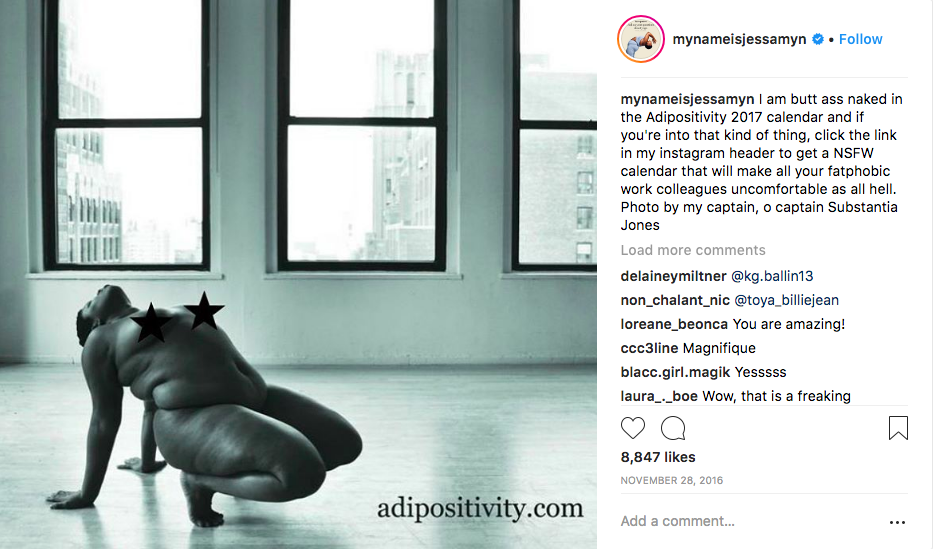
9) Even today, Stanley says students and yoga practitioners still make assumptions about her
A widely criticized XOJane essay, It Happened To Me: There Are No Black People In My Yoga Classes And I’m Suddenly Feeling Uncomfortable With It, published in January 2014. The writer, a white woman, projects her insecurities and assumptions on the only Black, fat person in her class.
“I saw the fear in her eyes snowball, turning into panic and then despair…I thought about how that must feel: to be a heavyset black woman entering for the first time a system that by all accounts seems unable to accommodate her body. What could I do to help her? If I were her, I thought, I would want as little attention to be drawn to my despair as possible—I would not want anyone to look at me or notice me. And so I tried to very deliberately avoid looking in her direction each time I was in downward dog, but I could feel her hostility just the same.”
Stanley said she still receives that similar reaction from students and other teachers who don’t know her. They expect her to not know how to go through her own practice, or to not be able to. However, the yoga studio is just one of the many physical places in which Stanley has been discriminated against as a fat, Black, queer woman. The best she can do is avoid taking part in the practice of projecting your own shame onto others.
“I just don’t understand why you’re in a yoga class making judgments about anyone other than yourself. That seems like you are not there to practice yoga, and I’m confused about the authority that you seem to feel in judging another human being for whatever reason,” Stanley said. “Whoever wrote that article should reconsider why they showed up to yoga that day, and see if they really got the experience that the universe was asking of them.”
Editor’s note: This article is regularly updated for relevance.

